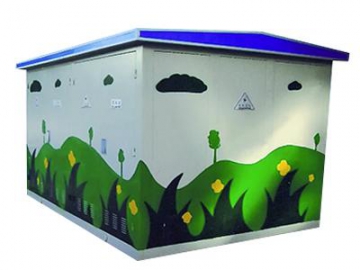Prefabricated Substations
Request a Quote
Prefabricated substations, also called European substations, are compact integrated power distribution devices composed of high-voltage electrical equipment, transformers and low-voltage electrical equipment that are all independently set with each other and connected using cables. Prefabricated substations are used for power distribution systems in high-rise buildings, airports, residential areas, medium to small factories, mines, oil fields and temporary construction sites for power acceptance and distribution.
Technical parameters
| Item | Unit | High voltage | Transformer | Low voltage |
| Rated frequency | Hz | | 50 | |
| Rated capacity | KVA | 10 | 30-2500 | 0.4 |
| Rated voltage | KV | 400630 | | 50-2500 |
| Rated current | KA | 12.2 (2s or 4s) 16(2s or 4s) 20(2s or 4s) | | 15(1s) 30(1s) 50(1s) 65(1s) |
| Rated short-time withstand current | KA | 42/48 | | |
| Power frequency withstand current | KV | 75/85 | | |
| Lightning impulse withstand voltage | KV | | 75 | |
| Tapping link range | KV | Ip33 | ±2*2.5% | Ip33 |
| Protection class | KA | | Ip23 | |
| Sound level | dB | | 50 |
Features
- ‘目’ or ‘品’ shaped structure.
- Shell materials: aluminum alloy plates, stainless steel plates, fiberglass reinforced cement boards.
- Substation bases are made of a galvanized channel steel or cement, giving them a strong corrosion resistance and exceptional mechanical strength.
- Two-layer top cover structure, featuring an excellent thermal insulation, radiation protection, and ventilation effects.
- Substations are separated into several independent chambers, and all chambers are equipped with lighting devices. Automatic air exhausting devices are installed on top of the transformers to adjust the temperature inside the transformer chambers.
- Flexible colors, matching with surroundings.
Working conditions
- Altitude: ≤1000m
- Wind speed: ≤34m/S (≤700pa)
- Ambient temperature: -35ºC - 40ºC
- Relative humidity: daily average humidity≤95%, monthly average humidity≤95%
- Installation site slop: ≤3º
- Installation site: Locations with no risk of fire or explosions, very little pollution, and no risk of chemical corrosion or vibration.
- For situations that do not satisfy the above conditions, please don’t hesitate to contact us for a consultation.
